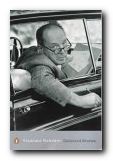complete shorter works – commentary and annotations
Nabokov began writing shot stories as a young man in early 1920s Berlin, publishing them along with chess problems in Rul’, the emigre Russian newspaper established by his father. He continued to do so in the 1930s whilst establishing his reputation as a novelist, writing under the name Vladimir Sirin. Production slowed down when he emigrated to the USA, and then stopped. in 1950 as his academic work and his international fame as a novelist took up all his time. Nevertheless he published four volumes in all during his own lifetime, totalling fifty stories. Vladimir Nabokov Collected Stories brings all those together in one volume and adds as a bonus thirteen extra tales that Nabokov didn’t think worthy of publishing in book form whilst he was alive. He listed these in a handwritten note as ‘Bottom of the Barrel’.
 Nabokov used the short story as a writer’s laboratory, exploring fictional devices and strategies that he then deployed at greater length in his novels. Not that there is anything unfinished or tentative about the results: Almost all his stories are superbly shaped and polished, and the most successful of them rank amongst the greatest modern short stories.
Nabokov used the short story as a writer’s laboratory, exploring fictional devices and strategies that he then deployed at greater length in his novels. Not that there is anything unfinished or tentative about the results: Almost all his stories are superbly shaped and polished, and the most successful of them rank amongst the greatest modern short stories.
It’s impossible to prove without seeing the original publications, but one can’t help but suspect that many of the stories were revised and re-polished for their first presentation. The whole Nabokov family was complicit in presenting its only wage earner’s work in the best possible light, and Nabokov used the services of both his wife and son as translators and literary assistants. [The recent publication of VN’s manuscript index cards for The Original of Laura demonstrates that the Olympian master was not above committing simple errors of spelling and grammar.]
Nabokov had an amazing range in the tone and subjects of his stories, even whilst retaining his own unmistakable prose style. The tales vary from lyrical evocations of childhood and prose poems which celebrate the surface textures of everyday life, through to narratives of black comedy and a taste for dramatic irony which treads a fine line between beauty and cruelty.
The Eye (almost a short novel, which strangely enough has not been included) is a masterpiece of narrative complexity and deception in which a first person narrator tries to convince us of his wit and popularity, does just the opposite, then resolves to kill himself half way through the story. How can this be? Nabokov contrives this narrative conundrum as another opportunity to show off his powers of subtlety and manipulation of point of view.
Spring in Fialta (which I think qualifies as a novella) is without doubt Nabokov’s most complex and successful achievement. The story of events is almost inconsequential. A narrator encounters an old lover and recalls his previous meetings with her. His memories of their apparently romantic past are wound together with his account of their latest episode in Fialta.
But the main focus of interest is the narrator’s reliability. He tells us one thing, but the facts as narrated suggest the opposite, even though they come to us from his account. Taken at face value, it’s just a romantic memoir: read more carefully, it’s a roccoco study in self-deception and narrative manipulation which might take several readings to fathom.
Nabokov continued his puzzle-making right to the end. One of his last short stories, The Vane Sisters is a tale in which the solution to a puzzle (a message left behind by someone who has died) is actually woven into the story itself. The narrator is unable to see the message, but provides enough information for the reader to do so. These are stories-cum-puzzles which as Nabokov himself claimed ‘can only be attempted once every thousand years’.
This is an excellent compilation of his whole oeuvre as a writer of short stories. It contains all Nabokov’s notes on the bibliographic history and full details of each story from their first publication, and it has an introductory essay by his son Dmitri which throws extra light on the collection as a whole.
![]() Analysis of Nabokov’s 50+ Stories
Analysis of Nabokov’s 50+ Stories
© Roy Johnson 2010
Vladimir Nabokov, Collected Stories, London: Penguin, 2008, pp.333, ISBN: 0141183454
More on Vladimir Nabokov
More on literary studies
Nabokov’s Complete Short Stories